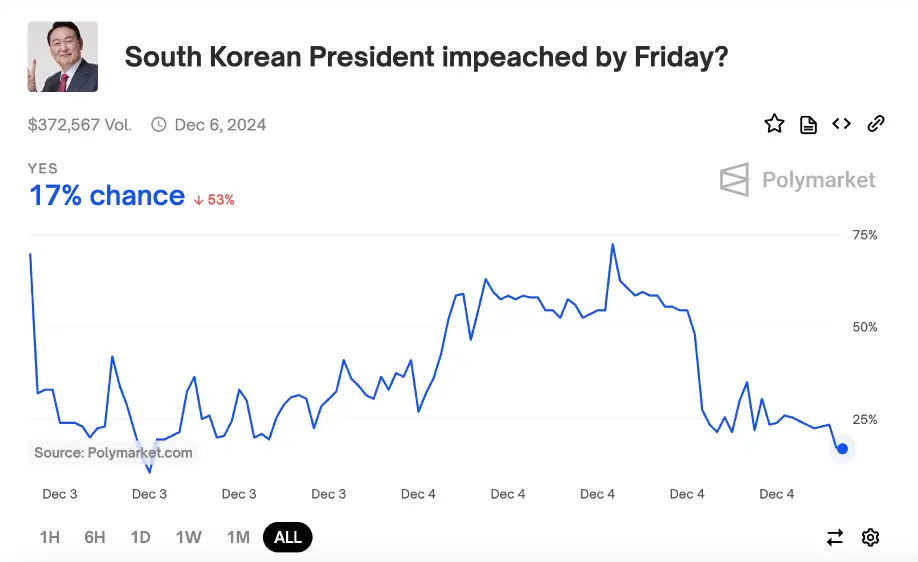South Korea is currently witnessing a major political crisis as its National Assembly debates the impeachment of President Yoon Suk-yeol following his controversial declaration of martial law earlier this week.
With the impeachment vote set to occur by Friday, as mandated by law, the nation and the world are closely watching to see if the assembly will move forward with removing the president from office.
Prediction markets insights: On Polymarket, a crypto prediction market, the market for Yoon’s impeachment by Friday saw trade volume surge past $360,000 within 24 hours.
- Odds fluctuated dramatically on Wednesday, swinging from 72% to 25% as traders processed breaking developments.
- A particularly sharp drop in “Yes” odds coincided with the People Power Party (PPP) leadership’s announcement of unified opposition to impeachment, suggesting that achieving the necessary bipartisan support might prove challenging.

What happened: The political storm began when President Yoon declared martial law on Tuesday, citing national security threats.
- The National Assembly, controlled by the opposition Democratic Party (DP), swiftly annulled the martial law declaration.
- On Wednesday, 190 members of the assembly, none from PPP, introduced an impeachment motion, accusing Yoon of overreach and undermining the Constitution.
- For the motion to succeed, it must secure a two-thirds majority—200 votes in the 300-member assembly—requiring at least eight members of PPP to break ranks.
Historical precedent: The current crisis inevitably draws comparisons to the 2016-2017 impeachment of former President Park Geun-hye.
- The DP led the assembly then, as it does now, but Park’s removal was ultimately secured through unprecedented public mobilization.
- The Candlelight Revolution, where millions of protesters demanded her ouster, proved decisive in achieving the supermajority needed for impeachment, with 234 lawmakers ultimately supporting her removal.
- While Park’s case centered on corruption allegations, Yoon’s situation stems from questions of constitutional overreach and executive power, presenting lawmakers with a fundamentally different calculus.
Reasons for impeachment:
- Yoon’s declaration of martial law could be seen as a severe abuse of executive power, undermining democratic principles.
- Internal party dissent could grow as PPP members weigh the political cost of standing by an increasingly unpopular president, thus voting to impeach to align with public sentiment or distance themselves from Yoon’s unpopularity.
- Yoon’s plummeting approval ratings, which have fallen to 19%, might suggest that such a dramatic step might be necessary to restore public trust in government.
Reasons against impeachment:
- So far, the PPP leadership has presented a united front in opposition to the motion, as many lawmakers fear alienating their conservative base by supporting impeachment.
- Impeachment requires not only political support but also legal justification. While the opposition argues that Yoon’s martial law declaration violates the Constitution, the PPP might counter that it falls within the president’s executive authority, complicating the legal case for removal.
- While Yoon’s martial law declaration has sparked widespread criticism and growing demonstrations, they have not yet reached the scale or intensity of the Candlelight Revolution, which was pivotal in mobilizing bipartisan support for Park’s removal. The absence of mass protests may weaken the momentum for Yoon’s impeachment.
Keep an eye out: As Friday’s mandated vote approaches, several key factors could tip the balance. Any cracks in the PPP’s united front could signal a higher likelihood of impeachment success. Additionally, if public demonstrations intensify significantly, the increased pressure could sway undecided lawmakers.
Besides the immediate short-term market, Polymarket also offers a longer-term market on “South Korean President impeachment in 2024.” The existence of both short and long-term prediction markets highlights how traders are weighing not just the immediate impeachment vote but also the possibility of future political challenges to Yoon’s presidency throughout the year – a testament to the ongoing volatility in South Korean politics.

























